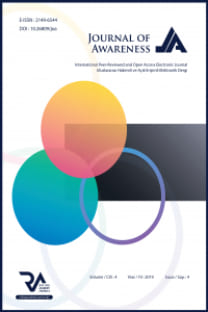ASPECTS OF LANGUAGE KNOWLEDGE IN PRECHOOLERS
Preschool child, language knowledge, reading skills, oral habits phonology, lexical.,
___
- Berzani, Alketa (2007), Si mësojnë fëmijët të flasin, Edukimi parashkollor, 10, Tiranë.
- Betts, E. Albert (1996), A New Area: Reading And Linguistics, Reading Teacher, Vol. 18.
- Bloomfield, Leonard (1993), Language, George Allen Of Unwin Ltd, New York.
- Brooks, Gavin (2013), Creating Interactive Electronic Materials for EFL Listening Classes, Conference Proceedings.http://www.academia.edu/9375214/Creating_Interactive_Electronic_Materials_for_EFL_Listening_Classes
- Elbow, Peter (1981, 1988), Writing With Power: Techniques For Mastering The Writing Process, Oxford University Press, London. http://staff.uny.ac.id/sites/default/files/pendidikan/dwi-budiyanto-spd-mhum/ebookscluborgwritingwithpowertechniquesformasteringthewritingprocess.pdf
- Hall, Donald (1983), “Four Kinds Of Reading”, Thinking In Writing, redaktuar nga McQuade, D.; Robert Atwan, K., New York.
- Idrees, Raiha (2010), Shqipëria lexon, Instituti i Zhvillimit të Arsimit, UNICEF.
- Jenkinson, Marion D. (1973), Ways of teaching, në The teaching of reading, redaktuar nga Stranger, R. C., UNESCO, Paris. http://unesdoc.unesco.org/images/0000/000045/004510eo.pdf
- Kamami, Pranvera (2007), Zhvillimi gjuhësor, Edukimi parashkollor, 10, Tiranë.
- Khosrow-Pour, Mehdi (2015), Encyclopedia of Information Science and Technology, Third Edition, IGI Global, Copyright. https://books.google.al/books?id=MJd_BAAAQBAJ&printsec=frontcover#v=onepage&q&f=false
- Kaplan, Robert B. (2010), The Oxford Handbook of Applied Linguistics, Oxford University, Press. https://books.google.al/books?id=nxH0k3UbAvAC&dq=Applied+Linguistics+7+(3),+pp.+284-302.&source=gbs_navlinks_s
- Leshi, Majlinda (2007), Gjuha në kopsht, Edukimi parashkollor, 10, Tiranë.
- Mato, Erlehta et. al., (2012), Gati për në shkollë, Libri i mësuesit, UNICEF, Tiranë.
- Saville-Troike, Muriel (2003), The Ethnography of Communication, Cowley Road, Oxford. https://gumonounib.files.wordpress.com/2010/06/the-ethnography-of-communication-an-introduction-third-edition-by-muriel-saville-troike.pdf
- Shkurtaj, Gjovalin (2005), Etnografia e të folurit të shqipes, Botimet Toena, Tiranë.
- ISSN: 2149-6544
- Başlangıç: 2016
- Yayıncı: Rating Academy
MODA TASARIMINDA ULUSLARARASI FARKINDALIK YARATMA
ÇEVRE SORUNLARINA EĞİTİMLE FARKINDALIK OLUŞTURMA
UMUDUN ÖLÇÜMÜ- FACEBOOK KULLANICILARI ÜZERİNE BİR ARAŞTIRMA
Nilsun SARIYER, Muammer CEYLAN
PRİZREN’DE YOK OLUP GİDEN OSMANLI İZLERİ: ŞAİP SİPAHİ KONAĞI
DOĞAL AFET DİRENCİNİ ÖLÇMEYE YÖNELİK BİR ANKET ÇALIŞMASININ İLK SONUÇLARI
